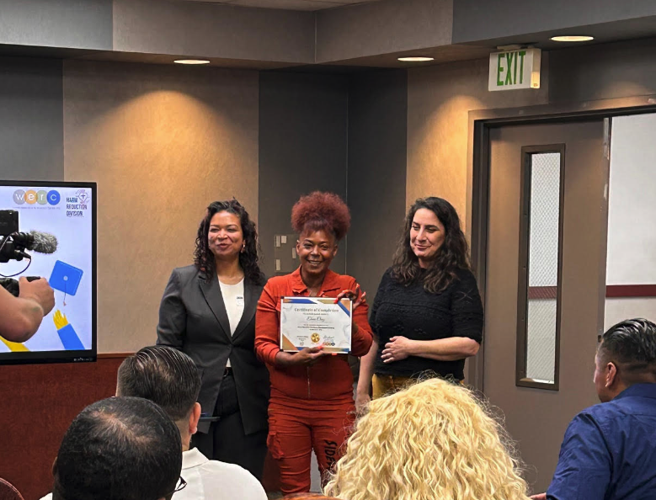
Elena Cruz (middle) accepts her certificate of completion for the Worker Education & Resource Center (WERC) program during the graduation ceremony. (Image credit: Soma Snakeoil).
Elena Cruz is a 45-year-old Afro-Boriqua woman and former sex worker who is passionate about working in harm reduction. She recently became one of the first graduates of the newly launched Worker Education & Resource Center (WERC) program, which is playing a critical role in transforming harm reduction services throughout Los Angeles.
Cruz first became involved with the groundbreaking initiative while volunteering with The Sidewalk Project, a street-based harm reduction organization. Now she is continuing that work as a paid employee, thanks, in part, to the professional development she’s received through WERC.
Launched by the L.A. County Department of Health Services (DHS), the WERC program specializes in hands-on training that equips participants to work as harm reduction support specialists or supervisors. The program is made up of approximately 33% Latino participants. The eight to 10- week curriculum offers free, comprehensive instruction on essential topics like safer drug use, engaging unhoused community members, compassionate communication and working within social services.
“I’m gaining confidence through the program,” said Cruz, reflecting on her growth. Since joining The Sidewalk Project, she has taken on the role of managing the front reception area where she helps connect visitors with resources. “Everyone who walks through the door needs something—whether it's a place to charge their phone, somewhere to sit or even a place to meditate. We provide a lot of things.”
Shoshanna Scholar, the director of the Harm Reduction Division for DHS, spoke to CALÓ News about the critical importance of programs like WERC and city-wide investments in harm reduction initiatives.
Scholar noted that until recently, many organizations that focus on harm reduction were often underfunded and relied heavily on volunteers. Many of these volunteers, like Cruz, had lived experiences that informed their work.
"The piece you can't substitute is a lived experience," Scholar states. "We wanted to make sure that we were hiring from the Skid Row community...and recruiting residents who have a long-term relationship connection with the area."
In recent years, Los Angeles County has intensified its efforts to develop a more comprehensive and inclusive strategy for public health. In 2023, the number of drug-related overdose and poisoning deaths in the county plateaued for the first time in a decade.
A significant portion of the work has been hindered by the stigma surrounding harm reduction initiatives, even in places like California, which is generally considered less conservative. In 2022, Gov. Gavin Newsom vetoed a controversial bill that would have allowed San Francisco, Oakland and Los Angeles to launch trial supervised drug injection sites. Harm reduction advocates and experts argue that the most effective way to tackle this public health issue is to meet individuals where they are.

Elena Cruz (left) and Soma Snakeoil (right) pose together for a quick selfie during the WERC graduation ceremony. (Image credit: Soma Snakeoil).
Soma Snakeoil, the executive director and co-founder of The Sidewalk Project, has been a strong supporter of Cruz throughout her journey in the job readiness program and urges political decision-makers to continue funding initiatives like WERC.
Snakeoil, a veteran in the harm reduction field, has long been a fierce advocate for both sex workers and unhoused community members. She emphasizes that Cruz’s success story is in part possible due to a “complex network of people within LA County who are really trying to do something different.”
Snakeoil asserts that there are many different systems at play, crediting The Sidewall Project, funds from Measure J, the Amity Foundation and DHS. “I hope that [Cruz’s] story is a story that shows why we need to fund all of these programs, because it not only supports the individual, it supports a community of care and is cyclical in giving back.”
Now, as Cruz begins a new chapter as a paid employee, she is excited to continue the work she is so passionate about. With the continuation of the WERC program, the hope is that more graduates with lived experiences will step into roles that support people in need. "Her lived experiences make her so good at her job," said Snakeoil of Cruz’s expertise.
For graduates like Cruz, the WERC program not only brings the knowledge gained in the program but also a sense of purpose and commitment to their communities.
“I wish I had those services back then, because I would be more confident.” Cruz reflects, “I would be more in tune, like how I am now.”













(0) comments
Welcome to the discussion.
Log In
Keep it Clean. Please avoid obscene, vulgar, lewd, racist or sexually-oriented language.
PLEASE TURN OFF YOUR CAPS LOCK.
Don't Threaten. Threats of harming another person will not be tolerated.
Be Truthful. Don't knowingly lie about anyone or anything.
Be Nice. No racism, sexism or any sort of -ism that is degrading to another person.
Be Proactive. Use the 'Report' link on each comment to let us know of abusive posts.
Share with Us. We'd love to hear eyewitness accounts, the history behind an article.